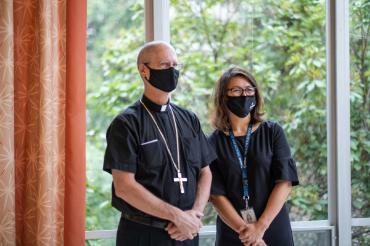 Renée Rassilyer-Bomers entered Seattle University through the Matteo Ricci College where she completed her senior year of high school while simultaneously earning college credit. And she’s never left. A triple alumna and Naef Scholar, she earned bachelor’s degrees in nursing and humanities, then dove straight into the Master of Science in Nursing (MSN) program. In 2005 she joined the Seattle U College of Nursing (CON) faculty, while concurrently navigating a professional trajectory into leadership at Swedish Hospital. In 2016 she completed the Doctor of Nursing Practice (DNP) program at Seattle U.
Renée Rassilyer-Bomers entered Seattle University through the Matteo Ricci College where she completed her senior year of high school while simultaneously earning college credit. And she’s never left. A triple alumna and Naef Scholar, she earned bachelor’s degrees in nursing and humanities, then dove straight into the Master of Science in Nursing (MSN) program. In 2005 she joined the Seattle U College of Nursing (CON) faculty, while concurrently navigating a professional trajectory into leadership at Swedish Hospital. In 2016 she completed the Doctor of Nursing Practice (DNP) program at Seattle U.
Now the Chief Quality Officer in Swedish’s Clinical Excellence Division, Dr. Rassilyer-Bomers played an integral role in establishing the Swedish Community COVID-19 Vaccination Clinic at Seattle University. She and her team of care providers took on the urgent challenge to site, organize, coordinate and staff a clinic capable of administering 2,500 COVID-19 vaccines a day—a feat they accomplished within just two weeks. Their successful model has received national attention.
Called to Battle COVID-19
When the COVID-19 vaccine arrived in Seattle in December 2020, Rassilyer-Bomers helped roll out on-site vaccination clinics for employees on the five Swedish hospital campuses. By early January, as the state of Washington looked toward vaccinating community members, they realized there weren’t many entities in the community that had the infrastructure ready to go right away and that in many areas of the state, hospitals were the best-equipped places to vaccinate high-risk groups quickly.
“Many organizations, like local pharmacies or the neighborhood clinic, lacked the infrastructure to deliver vaccinations in large mass, as well as to manage accompanying complications,” Rassilyer-Bomers explains, “like keeping the Pfizer vaccine hyper-frozen, handling required consent forms and immunization records and monitoring each vaccine recipient for 15 minutes in case of anaphylactic reactions.”
That’s when Governor Inslee and the Department of Health called for hospitals to step in and help vaccinate 500 community members a day, in addition to their own employees. With five campuses, this meant 2,500 additional daily vaccinations for Swedish.
“We couldn’t bring an additional 2,500 people onto our hospital campuses because of the exposure risk,” says Rassilyer-Bomers. “We don’t have enough parking and we’ve got COVID-19 patients. Right away I texted Dr. Kristen Swanson, dean of Seattle U’s College of Nursing, and said I need help. I need space to provide 2,500 COVID-19 vaccinations a day.”
Within a few hours Dean Swanson had received permission from President Stephen Sundborg, S.J., and other administrators to offer space on the university campus. Rassilyer-Bomers met with her team over a weekend to plan their strategy for organizing a high-volume vaccination clinic at Campion Hall on short turnaround. They created a “playbook” modeled after Swedish’s in-hospital employee vaccination clinics and adapted for Seattle U.
“We began putting teams of Seattle U and Swedish employees and volunteers together and worked with some great outside vendors,” she says. “Within a week we had 40 computers with Wi-Fi access, secure online systems for registering volunteers and patients and lots of vaccination stations set up in the space. We were ready for a walk-thru and simulation on day 10 and the clinic opened on day 12. While we vaccinated the community at the Seattle U clinic, Swedish continued vaccinating our employees and community providers on our hospital campuses.”
Swedish administered nearly 87,000 vaccinations at its clinics in response to the state’s call, with approximately 48,000 given at the Seattle U site. Nearly one-fifth of the Swedish volunteers were affiliated with the university.
The Playbook
Word spread about the “playbook” Swedish created, which is now distributed nationwide as a model for other COVID-19 vaccination clinics.
“Representatives from other hospitals, local government and businesses are using our playbook,” Rassilyer-Bomers says. “Administrators from Microsoft, Amazon and Starbucks visited the Seattle U clinic to check out our design and are now working with other hospitals to open clinics. Officials from the Public Health Department and Snohomish County also visited. Places utilizing the playbook provide us feedback on what is and isn’t working and their recommendations. We continue to adapt the book based on this feedback. This is an iterative process, much like any other endeavor in science and medicine. Currently, we’re on version five.”
“The Swedish Community COVID-19 Vaccination Clinic at Seattle University exemplifies the power of community partnership between academia and industry in moving the mountains we need to move to be a better society,” she adds. “I hope to see this kind of partnership replicated in a multitude of areas.”
Swedish is now working with the City of Seattle to open a mass vaccination site at Lumen Field Event Center, capable of servicing 154,000 people a week. The design of that site is based on the Seattle U model.
An Ongoing Connection to Seattle U
For years Rassilyer-Bomers taught undergraduate nursing courses five mornings a week in the CON while working night shift positions at Swedish.
“I love teaching,” she reflects. “I think it’s just the ability to support somebody’s learning and to see their joy. I used to teach Health Assessment, the first undergraduate nursing course when everything is new to the students and they’re eager beavers having dreamt about becoming a nurse. Now I teach the Senior Practicum each summer, right before the students launch into their careers. At the start of the practicum, nobody thinks they’ll ever be capable or competent enough, they don’t have enough clinical experience to do the job. By the end of that quarter, they see how all the dots connect and they fly! It’s incredibly rewarding to see this kind of student growth over four years.”
Currently, Rassilyer-Bomers is a part-time member of the CON faculty. She works to find clinical placements for nursing students in addition to teaching the Senior Practicum.
What keeps her at Seattle U? “The people,” she says. “The reason I continue working at Seattle U—and at Swedish—is of course the mission, vision and values, which I see as quite parallel. But it’s the people I work with, who have the passion to do right by caring for others, that compel me to stay. I work with really good people.”
The Swedish Community COVID-19 Vaccination Clinic at Seattle U concluded its operations on Feb. 26 and is working with community partners to build upon these efforts across the state.
Seattle U alumni are a vital to the academic, spiritual and emotional health of our community. As part of Our Moment for Mission: The President’s Challenge, you can join us in one of many volunteer roles, strengthening the university—and ensuring the wellbeing and advancement of our students, faculty and staff—for years to come.
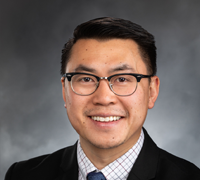
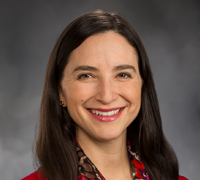

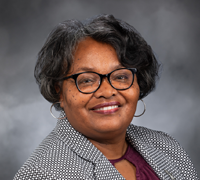
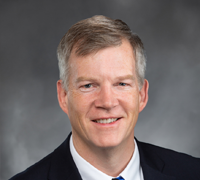
 Renée Rassilyer-Bomers entered Seattle University through the Matteo Ricci College where she completed her senior year of high school while simultaneously earning college credit. And she’s never left. A triple alumna and Naef Scholar, she earned bachelor’s degrees in nursing and humanities, then dove straight into the Master of Science in Nursing (MSN) program. In 2005 she joined the Seattle U College of Nursing (CON) faculty, while concurrently navigating a professional trajectory into leadership at Swedish Hospital. In 2016 she completed the Doctor of Nursing Practice (DNP) program at Seattle U.
Renée Rassilyer-Bomers entered Seattle University through the Matteo Ricci College where she completed her senior year of high school while simultaneously earning college credit. And she’s never left. A triple alumna and Naef Scholar, she earned bachelor’s degrees in nursing and humanities, then dove straight into the Master of Science in Nursing (MSN) program. In 2005 she joined the Seattle U College of Nursing (CON) faculty, while concurrently navigating a professional trajectory into leadership at Swedish Hospital. In 2016 she completed the Doctor of Nursing Practice (DNP) program at Seattle U.